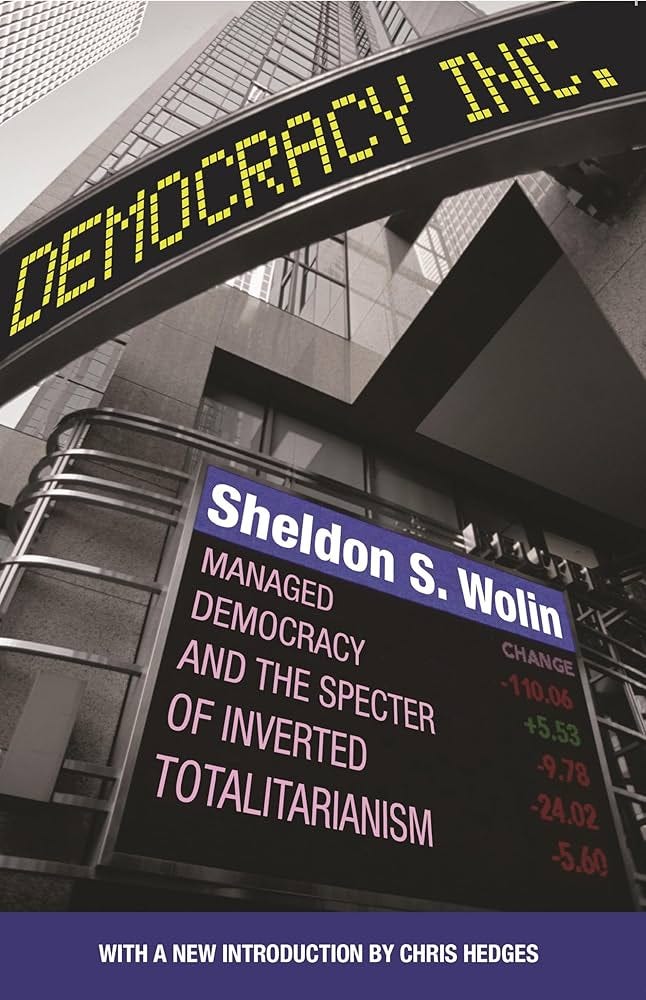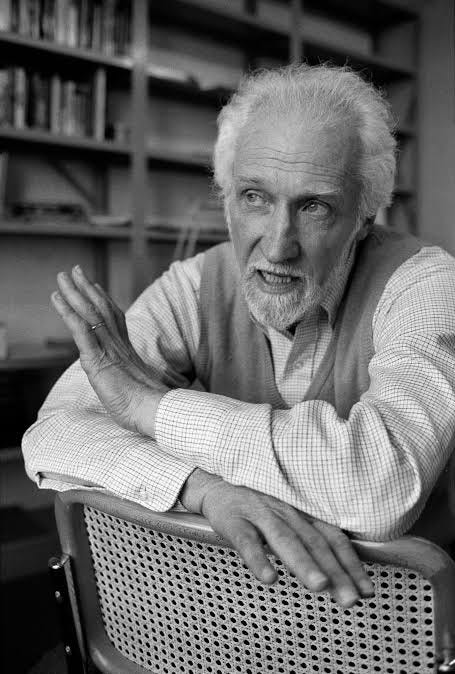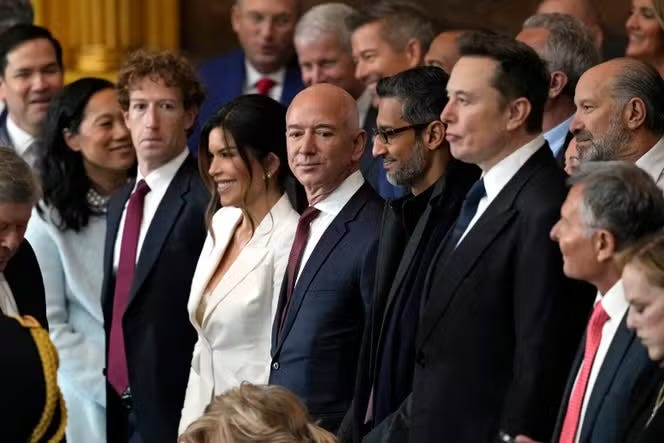Late-Stage Inverted Totalitarianism
“Fugitive democracy” and the road back to power
Sheldon Wolin was a political theorist with a long-celebrated body of work but his last book Democracy Incorporated: Managed Democracy and the Specter of Inverted Totalitarianism (2008) may be his most important. Written during the Bush administration, it describes an authoritarian form of government that doesn’t replace democracy entirely, it uses the mechanisms and symbols of a democratic form of government while separating the dêmos, the people, from the krátos, the power.


Here are some quotes from Wolin’s book on the concept of a managed democracy, a democracy in name only:
“Managed democracy is a political form in which governments are legitimated by elections that they have learned to control.”
“The genius of managed democracy lies in its ability to maintain the institutions and rituals of democracy while eliminating their democratic content.”
“It does not abolish elections, freedom of speech, or the rule of law; it manages them, rendering them compatible with elite governance and capitalist priorities.”
“Managed democracy is built on the illusion of consent, where the public is offered participation without power, and choice without consequence.”
“In managed democracy, corporate interests work through electoral and regulatory systems to ensure outcomes favorable to the status quo, often under the guise of public interest.”
Inverted totalitarianism, according to Wolin, is a political technique for achieving a managed democracy, a tool used by corporations, religions, and plutocrats to control the population while allowing for the theatrics of a democratic process to continue, essentially as camouflage.
“Inverted totalitarianism is not a revolutionary movement. It does not require a charismatic leader, a single party, or an ideology. It is, instead, a system of managed democracy where the illusion of popular control persists.”
“Whereas classical totalitarian regimes mobilized the masses to serve the state’s goals, inverted totalitarianism relies on mass passivity and political disengagement.”
“Corporate power has become fused with state power, creating a system where the two reinforce each other while hollowing out democratic institutions.”
“The genius of inverted totalitarianism lies in its ability to exploit the symbols of democracy—flag, Constitution, patriotic language—while undermining their substance.”
“The media play a central role in inverted totalitarianism: not by suppressing dissent, but by framing it, trivializing it, or substituting spectacle for substantive discourse.”
I would argue that Wolin’s diagnosis was correct, and that we have experienced a long, progressive hollowing out of body politic that began in earnest with the Cold War. With each Republican president that cheated to win an election—all of them since Nixon—and every Democratic administration that failed to hold them accountable since, the connection between the dêmos and the krátos became more and more tenuous.
However, it seems to me that Wolin’s managed democracy has entered a new phase, let’s call it late-stage inverted totalitarianism, in which the interests that control the government are no longer covert.
At this point in its progression, America’s managed democracy is no longer even “managed,” it’s just an open market for trading the labor & resources of the people, and the power of the government, to benefit a very, very few—and to oppress anyone who would challenge them.
While Wolin was a full-throated promoter of democracy, and celebrated its promise, his ideas were also in many ways quite radical, and arguably, a version of anarchism.
His conceptual version of democracy was not rooted in its use as a form of government, he saw it more as an emergent form of human desire, the counterforce of the managed to the managers, which he called “fugitive democracy.”
“Democracy is more likely to thrive in small political communities and during brief periods. It is more like a fleeting experience than a permanent condition.”
“Fugitive democracy is the democracy of those who are not in power, who act to disrupt the hierarchies, to assert popular agency, and to reclaim the political as a shared space.”
“Fugitive democracy can never be institutionalized without losing its democratic character. It is insurgent, unpredictable, and exists in the political acts of ordinary people.”
“It is a form of political life that occurs outside the managed routines of the political system. It takes shape in the streets, in occupations, in uprisings—spaces where people become active citizens rather than passive spectators.”
“Fugitive democracy is impermanent because it is dependent upon the energies of a mobilized people, energies that are difficult to sustain in the face of repression, fatigue, and manipulation.”
Remember, Wolin wrote these words in 2008, a time when most would have found his ideas to be over the top, a bit granola, even as we suffered through Bush. Then we elected Obama, right? How much worse could things really get? Well, now we know.
The brutality and violence of the Trump regime has just gotten started. We are in for a challenging time, a test of our collective will to remain free. But Wolin, despite his deep cynicism about government, was fundamentally optimistic.
The political can never be wholly eliminated, so long as people act together to speak, decide, and resist. Democracy survives in the cracks of domination.
Long live democracy. Slava Ukraini.
If you are able to help me continue my work, please consider upgrading to a paid subscription. It really means a lot. Thank you!
Here are a few benefits to upgrading:
Live Zoom call each Sunday
Substack Live AMA every week, video posted for paid subscribers
Ability to comment and access all content
Wonderful, supportive community
Helping independent journalism fill in the gaps for our failing media
Thank you for reading and sharing my work. Grateful for your support.
If you’d like to help me with expenses, here is my DonorBox. 💙
If you’d like to help with my legal fees: stopmikeflynn.com.
My podcast is @radicalizedpod & YouTube — Livestream is Thursdays at 4PM PT.
Bluesky 🦋: jim-stewartson
Threads: jimstewartson
Tiktok: @jimstewartson




Thank you for this excellent essay. I believe the approach to dealing with this threat that’s most likely to succeed to a pro-active one. To quote Buckminster Fuller, “Don’t fight the existing system. Design a better system that makes the existing system obsolete.” That’s the goal of a project I’m working to launch with a speech I’m giving in September at the Oklahoma Museums Association’s annual conference. I’m calling it the American Moonshot Project. It will propose replacing the existing corrupt system with one based one values and developmental principles championed by societal transformation advocates such as Bucky Fuller, W Edwards Deming, Riane Eisler, Stephen R Covey, Fred Rogers and others.
If you’d like to know more, please let me know.
Wolin's definition of fugitive democracy sounds more like protest or town halls on a small scale than democracy per se. He was a discerning political scientist very aware of the forces that made a mockery of democratic forces within society. (Chris Hedges interviewed Wolin several time before Wolin passed.)
Dr Paul Zeitz, author, physician and activist, has written a book that I think (?) includes information on Citizens' Assemblies. Here is the title of book: "Hit Refresh on the U.S. Constitution: A Revolutionary Roadmap for Fulfilling the Promise of Democracy."
Here is an article on Citizens' Assemblies in the US.
https://www.newamerica.org/political-reform/briefs/comparing-citizens-assemblies-across-the-united-states/
It's possible to use these and other tools to change the future. We can't just keep reacting. We have to rebuild what works, build new forms/organizations and not let the bad guys win by oppressing us and defeating us mentally and spiritually. If we have parallel structures like public banking (and workers coops), we can defeat them.
https://publicbankinginstitute.org/
We are many. They are few. This is a significant advantage. We just have to use it.
Lincoln might not have created the phrase. Don't know if he even repeated it, but it's still useful:
"You can fool some of the people all of the time, and all of the people some of the time, but you can not fool all of the people all of the time."